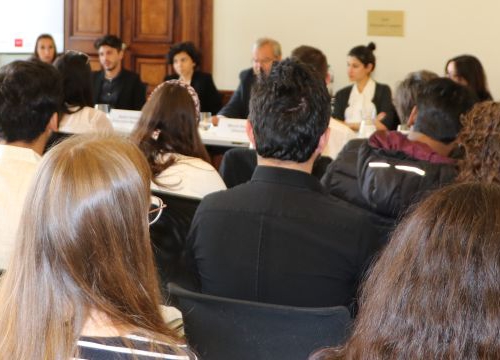64 New Students Start their Academic Year


Geneva Academy
11 September 2019
Students of our LLM in International Humanitarian Law and Human Rights (LLM) and MAS in Transitional Justice, Human Rights and the Rule of Law (MTJ) just arrived at the Geneva Academy for a busy orientation week before courses start next week.
‘Orientation week is an opportunity for our students to make friends and learn more about studying at the Geneva Academy and living in Geneva. Information sessions help them familiarize with the Geneva Academy, their programme and the campus, as well as with administrative and legal issues related to their arrival in Geneva like the health insurance, residence permits or bank accounts’ explains Dany Diogo, Coordinator of Masters Programmes at the Geneva Academy.
2019–2020 Academic Year: A Diverse and Experienced Student Community
LLM
The 2019–2020 LLM class has 39 students from 26 countries: Argentina, Bangladesh, Belgium, Canada, Colombia, Czech Republic, Ethiopia, Eritrea, France, Greece, India, Italy, Iran, Kenya, Lebanon, Mexico, New Zealand, Nigeria, Portugal, Russia, Spain, Sweden, Syria, Turkey, the United Kingdom, and the USA.
‘Our LLM students come from different legal and professional backgrounds: many just finished their graduate studies, while others already worked as attorneys, in NGOs, as university teachers or in the military of their country, which tremendously enriches discussions and exchanges in classes’ underlines Professor Marco Sassòli, Director of the Geneva Academy.
‘The LLM programme is full time and very demanding: besides acquiring the legal tools to address contemporary humanitarian and human rights challenge, students will also develop their own critical thinking to apprehend these. The aim is to train persons able to work in practice, not academics, although some return after a few years in practice to undertake doctoral studies’ he adds.

MTJ
The 2019–2020 MTJ class has 25 students from 21 countries: Argentina, Brazil, Canada, Colombia, France, Georgia, Germany, Iran, Italy, Kazakhstan, Kenya, Kosovo, Kyrgyzstan, Lebanon, Mexico, Peru, Sri Lanka, Sweden, Switzerland, Syria, and United Kingdom.
‘It is always a pleasure to meet our students in person: while we get to know them through the application process, having them here at the Geneva Academy means for us the beginning of an intense academic year with a busy programme, rewarding academic exchanges and a mutual learning process’ underlines Frank Haldemann, Co-Director of the Geneva Academy.
‘This year’s class is very diverse: we have students from different regions, professional experiences and disciplinary backgrounds, which is always a plus for exchanges and discussions in class’ stresses Thomas Unger, Co-Director of the Geneva Academy.

26 Scholarships
14 students from the MTJ and 12 from the LLM received a full or partial scholarship. These are allocated through a highly competitive process based on criteria established by the scholarship donors, and which notably include academic merit, extracurricular achievements and the candidate’s financial needs.
‘Our donors limit scholarships to students from countries of the Global South and Eastern Europe. Only one fee waiver is available for other LLM students’ explains Marco Sassòli.
A Later Start for the Executive Master in International Law in Armed Conflict
The Executive Master in International Law in Armed Conflict will start on Thursday 3 October.
‘As this programme is a part-time one designed for professionals, it starts a bit later: applications are in fact still open until 23 September and we expect to have around 15 to 20 participants’ explains Dany Diogo.










